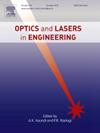An improved quaternary complementary Gray code phase unwrapping method in fringe projection profilometry
IF 3.5
2区 工程技术
Q2 OPTICS
引用次数: 0
Abstract
This paper presents a phase unwrapping method utilizing an improved quaternary complementary Gray code in fringe projection profilometry. Traditional methods often require a high number of additional projection patterns, which are aimed to be minimized. The proposed approach decomposes the last quaternary Gray code pattern into two binary Gray codes, integrating a complementary strategy for error prevention. This method enhances the accuracy of order calculation while retaining the efficiency of the quaternary Gray code. To obtain the codewords corresponding to the four grayscale levels more conveniently and accurately, a point-to-point threshold segmentation strategy is introduced to enhance segmentation. Additionally, an isolated order correction strategy is proposed to mitigate noise-induced errors. Experimental results validate the feasibility and superiority of the method over conventional techniques, demonstrating its improved efficiency and robustness.
边缘投影轮廓测量中的改进型四元互补格雷码相位解除方法
本文介绍了一种在条纹投影轮廓测量中利用改进的四元互补格雷码进行相位解包的方法。传统方法通常需要大量额外的投影图案,目的是尽量减少这些图案。所提出的方法将最后一个四元灰度编码模式分解为两个二进制灰度编码,并整合了一种互补策略来防止错误。这种方法既提高了阶次计算的准确性,又保留了四阶格雷码的效率。为了更方便、更准确地获得与四个灰度级相对应的编码,引入了点对点阈值分割策略,以增强分割效果。此外,还提出了一种孤立阶校正策略,以减轻噪声引起的误差。实验结果验证了该方法的可行性和优于传统技术的优势,证明了其效率和鲁棒性的提高。
本文章由计算机程序翻译,如有差异,请以英文原文为准。
求助全文
约1分钟内获得全文
求助全文
来源期刊

Optics and Lasers in Engineering
工程技术-光学
CiteScore
8.90
自引率
8.70%
发文量
384
审稿时长
42 days
期刊介绍:
Optics and Lasers in Engineering aims at providing an international forum for the interchange of information on the development of optical techniques and laser technology in engineering. Emphasis is placed on contributions targeted at the practical use of methods and devices, the development and enhancement of solutions and new theoretical concepts for experimental methods.
Optics and Lasers in Engineering reflects the main areas in which optical methods are being used and developed for an engineering environment. Manuscripts should offer clear evidence of novelty and significance. Papers focusing on parameter optimization or computational issues are not suitable. Similarly, papers focussed on an application rather than the optical method fall outside the journal''s scope. The scope of the journal is defined to include the following:
-Optical Metrology-
Optical Methods for 3D visualization and virtual engineering-
Optical Techniques for Microsystems-
Imaging, Microscopy and Adaptive Optics-
Computational Imaging-
Laser methods in manufacturing-
Integrated optical and photonic sensors-
Optics and Photonics in Life Science-
Hyperspectral and spectroscopic methods-
Infrared and Terahertz techniques
 求助内容:
求助内容: 应助结果提醒方式:
应助结果提醒方式:


